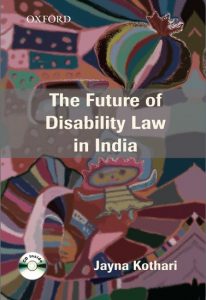Jayna Kothari has published The Future of Disability Law in India: A Critical Analysis of the Persons with Disabilities (Equal Opportunities, Protection of Rights and Full Participation) Act 1995 (Oxford University Press 2012). Here’s the abstract:
According to the 2001 census, India has more than twenty million people suffering from various disabilities. However, disability law in India does not adequately address this issue. This book analyses the rights of the disabled people from the perspectives of equality and human rights. It argues that due to various disabilities these people are discriminated against and that, like any other citizen of the country, they have an equal share in its resources. Although the government over the years has made efforts to improve the lives of disabled people, much of it remained only symbolic in nature. The major step forward, however, came with the passing of the Persons with Disability (PWD) Act in 1995. The volume critically reviews this Act, which is aimed to provide equal opportunities to the people with disabilities. It contends that though the Act has been in force since 1996, due to lack of clarity, often the civil society groups, judges, and even lawyers have found its provisions difficult to interpret. The author also discusses the role of private sector in providing social security to the disabled. The book addresses the critical issue of amending the disability law to bring it in compliance with the prevailing international legislation-the UN Convention on the Rights of Persons with Disabilities (CPRD).
This book critically reviews the Persons with Disabilities (Equal Opportunities, Protection of Rights and full Participation) Act of 1995 in India.
- It addresses the core themes of the statute, which revolve around equality and non-discrimination. Hence, it adopts a human rights and equality approach.
- It suggests possible amendments to the PWD in order to bring it in compliance with the United Nations Convention on the Rights of Persons with Disabilities (CPRD). In doing so, it uses national and international precedents.
- It also analyses the role of the private sector in providing social security to the disabled.
Read more about the book here.

